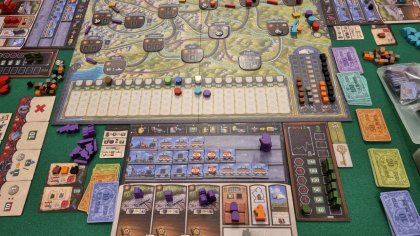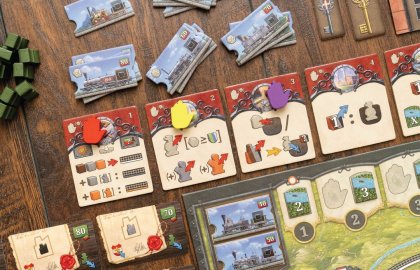Sempre bellissime queste interviste! 😍
L'intervista è stata fatta in inglese, questa è una traduzione delle risposte di Alexander, in fondo all'articolo troverete anche la versione originale
TdG
Come hai inventato la meccanica del gioco e quanto tempo ci è voluto per svilupparlo in un gioco finito?
A.H.
Per rispondere a questa domanda, devo spiegare brevemente il mio processo di invenzione di un gioco. Fondamentalmente, inizio con la tematica e raccolgo le informazioni principali. Il passo successivo (e probabilmente uno dei più importanti) è pensare alla sensazione che voglio ottenere nel gioco. Sviluppo il gioco attorno alle sensazioni, per così dire. I meccanismi emergono quindi da queste 2 aree, che dovrebbero servire sia il tema che la sensazione di gioco nel modo più armonioso possibile.
Questo quindi crea il "gioco nella mia testa". Solo quando è giocabile mentalmente, comincio a realizzare il primo prototipo.
Nel caso di Imperial Steam, il "lavoro mentale" è durato alcuni anni. Penso di aver avuto le prime idee nel 2016.
Il tempo dal primo prototipo al gioco finito (per me) è durato solo pochi mesi.
La cosa sorprendente è che il primo prototipo di Imperial Steam era già molto vicino al gioco attuale.

Un sacco di nuovi giochi sono prodotti ogni anno, cosa pensi un gioco debba avere per emergere dalla massa?
A.H.
Per me, un gioco si distingue dalla massa quando combina un tema interessante con un gameplay sfidante ed emozionante.
Per "sfidante" intendo un gioco abbia anche "spigoli" ma in cui le decisioni abbiano effetti reali sul gameplay (sia positivi che negativi).
Per quanto strano possa sembrare, un gioco troppo rifinito ed equilibrato non suscita il mio interesse ad esplorare ulteriormente.
TdG
Il sistema dei prestiti degli investitori è molto originale, perché permette di essere anche un modo per realizzare punti a fine partita, ma per quello che ho potuto vedere molti giocatori non riescono a fare corrette valutazioni sulla convenienza di aumentare il numero di investitori e sul tempismo nel farlo. Ti sei ispirato a qualcosa?
A.H.
Il sistema di crediti o azioni era in realtà parte dello sviluppo fin dall'inizio. L'ispirazione per questo meccanismo è venuta dalla storia della costruzione ferroviaria. Le società dipendevano da capitali o azionisti esterni per attuare i loro piani. All'inizio dello sviluppo, questo meccanismo ha svolto un ruolo molto più importante. C'erano 6-9 azionisti alla fine del gioco ;) Personalmente, mi piaceva, ma sulla base del feedback dei playtester, è stato necessario trovare un compromesso.
TdG
Raggiungere Trieste cambia il punteggio finale, stravolgendo i piani dei giocatori con debiti. Come sei arrivato a quest'idea e non ti spaventa l'eventuale frustrazione che un giocatore può provare per lo stravolgimento dei propri piani.
A.H.
Dato che Imperial Steam doveva riflettere la competizione tra le compagnie, era anche chiaro che le azioni dei giocatori dovevano influenzare anche le loro tattiche e strategie (d'altra parte, hai anche l'opportunità di essere tu a influenzare gli altri giocatori attraverso le tue azioni).
Ciò significa anche, tra l'altro, che dovresti sempre tenere d'occhio i tuoi avversari e prendere in considerazione qualsiasi cambiamento per le tue tattiche o strategie. Penso che sia proprio questa interazione che rende le decisioni più interessanti, più rilevanti e mantiene il gioco "vivo" ed emozionante fino alla fine.
Questi meccanismi comprendono non solo la costruzione del percorso, il tracciato influenza, le spedizioni, ma anche il collegamento con Trieste.
Per quanto riguarda la frustrazione, darò la mia opinione nella prossima domanda.

Mi sembra che i giochi di oggi cerchino di evitare di “punire” i giocatori proponendo giochi più incentrati sull'ottimizzazione delle risorse possedute più che sulla necessità di ottenerne. Imperial Steam va nella direzione opposta, è un gioco che ti fa sbagliare e non ti aiuta a recuperare sugli altri giocatori. Durante la creazione e la fase di playtest hai mai avuto la paura di star creando un gioco troppo complesso?
A.H.
Sì, Imperial Steam è abbastanza punitivo e non aiuta se commetti errori. Questo è probabilmente un grande vantaggio e un grande svantaggio del gioco.
Fondamentalmente, per me la sensazione del gioco è uno dei criteri più importanti per un gioco ben fatto e emozionante, quindi è sulla sensazione che baso lo sviluppo di un gioco.
I sentimenti hanno una vasta gamma e i sentimenti positivi e negativi sono in parte dipendenti l'uno dall'altro. Ho scoperto da me che quanto maggiore è questa gamma in un gioco, tanto più suscita il mio interesse e mi affascina. Cerco anche di incorporare questa gamma di sentimenti nei miei giochi. Per me, ci sono sentimenti sia positivi che negativi. Così si spiega parte della frustrazione. Il solo fatto di sapere che puoi farti strada in una situazione di gioco piuttosto frustrante attraverso decisioni sbagliate o attraverso altri giocatori dà più peso a ogni singola decisione e, secondo me, contribuisce molto a rendere eccitante il gameplay.
Penso che i successi, o i successi parziali nel gioco, siano vissuti più intensamente di conseguenza.
Lo svantaggio qui è probabilmente alla prima partita. Quando le persone sperimentano una situazione frustrante alla prima partita, spesso non danno un'altra possibilità al gioco.
Per quanto riguarda la complessità di Imperial Steam. Non credo che Imperial Steam possa generalmente essere classificato come un gioco molto complesso. Le azioni del gioco sono abbastanza semplici. La complessità deriva maggiormente dalle situazioni di gioco che si vengono a creare. Di conseguenza, Imperial Steam non è certamente un gioco per tutti (che comunque non esiste), ma ci sono molti giocatori che vedono una sfida nell'affrontare un gioco più complesso e questo glielo fa apprezzare.
TdG
Spesso il gioco viene paragonato a Brass, e il mercato delle risorse ricorda, almeno esteticamente il gioco di Wallace. Che ne pensi di questo paragone?
A.H.
Prima di tutto, mi sento molto lusingato che Imperial Steam sia paragonato a Brass ;) Martin Wallace è uno dei miei autori preferiti, quindi è un grande onore che Imperial Steam sia paragonato a uno dei suoi giochi.
Forse questo confronto deriva dalla grafica del gioco?
Inoltre, non so (soprattutto se ti piacciono davvero i giochi di un autore) quanto dello "stile di design" di un altro autore sia inconsciamente incorporato nei tuoi progetti. Secondo me, Brass e Imperial Steam sono molto diversi in termini di sensazioni e meccaniche di gioco.
In realtà pensavo che Imperial Steam fosse più paragonabile a Lignum in quanto mi sembra più simile a quel gioco, sebbene siano anch'essi diversi.

Segui qualche altro premio? Sei orgoglioso di vedere i tuoi giochi premiati da una giuria, o comunque contano di più le vendite?
A.H.
Sì, seguo alcuni premi di giochi da tavolo, principalmente quelli dedicati a giochi più complessi (ad esempio: Goblin Magnifico, ovviamente, Jogo do Ano dal Portogallo, Golden Elephant Award...), visto che preferisco i giochi di maggior complessità.
Certo, mi rende anche orgoglioso quando un mio gioco riceve un premio. Questo è un grande onore e riconoscimento per quelli che di solito sono stati anni di lavoro. Grazie ancora per il premio ;))
Dal momento che non mi guadagno il "pane quotidiano" inventando giochi, le cifre di vendita di un gioco non sono di grande importanza per me (a differenza dell'editore, comprensibilmente).
TdG
Hai giocato altri giochi della nostra selezione? (Ankh, Oath, Pax Vikings, Messina 1347, Sleeping Gods, Ark Nova). Se si, quale hai apprezzato di più e perché?
A.H.
È davvero un peccato, ma non ho giocato a nessuno dei giochi citati fino ad ora. Spero di poterlo recuperare in un prossimo futuro.
TdG
Dicci qualcosa sui tuoi prossimi progetti
A.H.
Al momento sto lavorando a un gioco basato su una combinazione di economia, logistica e guerra (religiosa). L'argomento è la rivolta contadina dell'Austria Settentrionale nel 1626. Al momento c'è già un'idea molto interessante per realizzare o sviluppare azioni. Spero di riuscire a realizzare questa idea. Ma non so esattamente come si svilupperà il gioco da quel momento in poi. Solo la sensazione che voglio nel gioco è già certa... ;)
Grazie per le interessanti domande e buon proseguimento, Alex
Intervista a Alexander Huemer O.V.
A.H.
First of all, thank you very much for the interview and the really interesting questions!

How did you invented the core mechanic of the game and how long did it take to be developed in a finished board game?
A.H.
To answer that question, I need to briefly explain my process of inventing a game. Basically, I start with the topic and collect relevant information. The next step (and arguably one of the most important) is to think about the feel I want to achieve in the game. I develop the game around feelings, so to speak. The mechanisms then emerge from these 2 areas, which should serve both theme and playing feel as harmoniously as possible.
This then creates the “game in my head”. Only when it is mentally playable, I start to make the first prototype.
In the case of Imperial Steam, the "mental work" took a few years. I think I had the first ideas in 2016.
The time from the first prototype to the (for me) finished game only took a few months.
What was amazing was that the first prototype of Imperial Steam was already very close to the now finished game.
TdG
Tons of new games are produced every year. What do you think a game should have to emerge from averageness?
A.H.
For me personally, a game stands out from the crowd when it combines an interesting theme with a challenging and exciting gameplay.
By "challenging" I understand that a game also has "rough edges" and decisions also have real effects on the gameplay (both positive and negative).
Strange as it may sound, a too polished and balanced game doesn't arouse my interest to explore further.
TdG
The system of loans of investors is original, because it allows you to score points at the end of the game, but as far as I could see many players fail to make correct assumption on the convenience of increasing the number of investors and when to do it. Were you inspired by something?
A.H.
The credit or share system was actually part of the development from the beginning. The inspiration for this mechanism actually came from the history of railway construction. The companies were dependent on outside capital or shareholders to implement their plans. At the beginning of development, this mechanism played a much more important role. There were 6-9 shareholders at the end of the game ;). Personally, I liked that, but based on the feedback from test players, a compromise solution had to be found.

Reaching Trieste changes the final score and overturns the plans of players with debts. How did you come up with this idea and weren't you afraid of possible player frustration for the overturning of the final score?
A.H.
Since Imperial Steam was supposed to reflect the competition between the companies, it was also clear that the actions of the players should also influence their own tactics and strategy (on the other hand, you also have the opportunity to influence the players through your own actions).
This also means, among other things, that you should always keep an eye on your fellow players and include any twists and turns in the game in your tactics or strategy. I think it is precisely this interplay that makes decisions more interesting, more relevant and keeps the game "alive" and exciting until the end.
These mechanisms include not only route building, the influence track, deliveries, but also the connection to Trieste.
Regarding the frustration, I'll give my opinion in the next question.
TdG
I have the perception that today's games try to avoid "punishing" players by proposing games that focus more on optimizing the resources possessed rather than on the need to obtain them. Imperial steam goes in the opposite direction, it's a game that lets you make mistakes and doesn't help you catch up with other players. During the creation and playtest phases, have you ever been afraid of creating a game that is too complex?
A.H.
Yes, Imperial Steam is quite punitive and doesn't really help if you make mistakes. This is probably a big advantage and a big disadvantage of the game.
Basically, for me the feel of the game is one of the most important criteria for a good and exciting game and I therefore base the development of a game on it.
Feelings have a wide range and positive and negative feelings are partly dependent on each other. I've found for myself that the greater this range there is in a game, the more it arouses my interest and fascinates me. I also try to incorporate this range of feelings into my games. There are both positive and negative feelings for me. So is some of the frustration. Just knowing that you can maneuver your way into a rather frustrating game situation through bad decisions or through other players gives every single decision more weight and, in my opinion, contributes a lot to the excitement of the gameplay.
I think successes or partial successes in the game are experienced more intensively as a result.
The disadvantage here is probably the first game. When people experience a frustrating situation in the first game, they often don't give the game another try.
Regarding the complexity of Imperial Steam. I don't think that Imperial Steam can generally be classified as a very complex game. The actions that drive the game are kept fairly simple. The complexity lies more in the resulting game situations. As a result, Imperial Steam is certainly not a game for everyone (which doesn't exist anyway), but there are also many who see a challenge in more complex game situations and also enjoy it.
TdG
Often the game is compared to Brass, and the resource market aesthetically refers to Wallace's game. What do you think of this comparison?
A.H.
First of all, I feel very flattered that Imperial Steam is compared to Brass ;). Martin Wallace is one of my favorite authors, so it's a great honor that Imperial Steam is compared to one of his game.
Maybe this comparison is based on the visuals of the game?
Also, I don't know (especially if you really like the author's games) how much of another author's "design style" is unconsciously incorporated into your own designs. In my opinion, Brass and Imperial Steam are very different in terms of playing feel and mechanics.
I actually thought that Imperial Steam was more comparable to Lignum as it feels closer to that game, although they are also different.

Do you follow any board game awards? Are you proud seeing your games being awarded by a panel of judges, or yet sales count more?
A.H.
Yes, I follow some board game awards, mainly those dedicated to more complex games (for example: Goblin Magnifico, of course, Jogo do Ano from Portugal, Golden Elephant Award,...), since my personal preference is also the games with higher complexity is applicable.
Of course, it also makes me proud when a game of mine receives an award. That is a great honor and recognition for what has usually been years of work. Thank you again for your award ;))
Since I don't earn my "daily bread" by inventing games, the sales figures of a game are not of great importance to me (unlike a publisher, understandably).
Did you play any other game of our selection? (Ankh, Oath, Pax Vikings, Messina 1347, Sleeping Gods, Ark Nova). If yes, which did you appreciate more and why?
It's a pity really, but I haven't played any of the games mentioned until now. I hope I can catch up on that in the near future.
TdG
Tell us something about your next projects
A.H.
At the moment I am working on a game that is based on a combination of economy, logistics and (religious) war. The topic is the Upper Austrian peasant uprising in 1626. At the moment there is already a very interesting idea to carry out or develop actions. I hope to be able to implement this idea. But I don't know exactly how the game will develop from then on. Only the feeling of the game is already certain...;)
Thank you very much for the interesting questions and all the best, Alex








